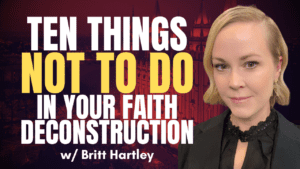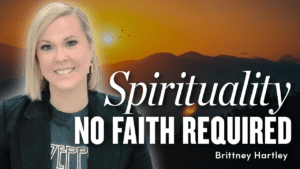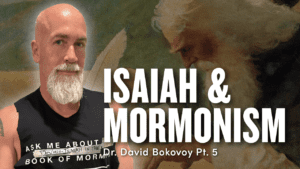In this interview, we delve into Brittney Hartley’s journey as an Atheist spiritual director, exploring her Mormon upbringing, faith crisis, and profound shifts in beliefs. From being kicked out of home at 16 to grappling with Mormon doctrine and culture at BYU-Idaho, Brittney’s story navigates her loss of faith, teaching seminary, raising kids outside the Church, and finding herself in nihilism’s depths.
The conversation touches on existential fears, embracing the absurdity of life, and the power of personal growth through dark times. Brittney’s insights challenge conventional beliefs, highlighting the value of authenticity, inner peace, and ethical living beyond religious confines.
This is a must-watch for anyone struggling to find meaning in life after leaving religion.
Mormon Stories Thanks Our Generous Donors!
Help us continue to deliver quality content by becoming a donor today:
Our Platforms:
Contact us:
MormonStories@gmail.com
PO Box 171085, Salt Lake City, UT 84117
Social Media:
Show Notes:
- Please donate to Mormon Stories
- Mormon Philosophy Simplified by Brittney Hartley
- No Nonsense Spirituality – Website
- No Nonsense Spirituality – Instagram
- No Nonsense Spirituality – TikTok
- Almost Awakened – Podcast
- Mormonism Live! – YouTube
- Mormon Expressions
- John Larsen
- Restore Conference, progressive Mormons
- A Thoughtful Faith Podcast
- Leonard Arrington
- Enneagram Resource
- Year of Polygamy podcast
- The Truman Show
- Allan Mount – Instagram
- Irvin Yalom and his four existential fears
- Bill Reel
- Albert Camus
- Friedrich Nietzsche
- “Throw a rose” quote
- The Power of Now by Eckhart Tolle
- A New Earth by Eckhart Tolle
- Secular Buddhism by Noah Rasheta
- Maslow’s Hierarchy of Needs
- Atheism 2.0 Ted Talk
- Sam Harris vs Jordan Peterson
- Religion for Atheists by Alain de Botton
- The Spiritual Atheist by Nick Jankel
- For Small Creatures Such as We by Sasha Sagan
- Rational Mysticism by John Horgan
- Boise LDS Post-Orthodoxy Support Group on Facebook
- Unf*ck Your Brain Podcast
- Brene Brown
- WAKA Women of a certain Age on Facebook
- Faith Journey Meetups
- THRIVE Beyond Religion
- ExMormon Reddit
- Faith Matters – Restore Conferences
- Waters of Mormon Facebook Group
- Black Mances Podcast
- Girls Camp Podcast
MSP Related
- 1784-1786: The Making of Mormon Bishop Bill Reel – Bill & Amanda Reel
- 1025-1028: The Excommunication of Mormon Bishop and Podcaster Bill Reel
- 1722: Buddhism for Beginners w/ Noah Rasheta | Mormon Stories Book Club
- 1656-1658: A Scholarly Defense of Mormonism – Patrick Mason
- 1803: How “Thoughtful” Mormons Stay in the Church – Dan McClellan Part 3
- 1802: 10 Things You Should Know About the Bible – Dan McClellan Part 2
- 1801: Mormon Bible Scholar – Dan McClellan Part 1




9 Responses
So excellent!
Fantastic episode! As a former Mormon by baptism only, now ex-Mormon on paper, and curious Atheist, I found this conversation one of the most substantive of all Mormon Stories episodes! Excellent!
One of the best discussions I’ve heard this year. Brittney has a lot to say and says it well. Thanks!
After listening to Brittney talk about Nihilism and the time she spent in that space, I had a great deal of empathy for her situation. I felt strongly that I would have probably joined her there if I had been an active, believing, Latter-day Saint who went down the rabbit hole. Fortunately, that has not been the case for me since I have never been a Mormon and I have never lost faith in God. I am a mainstream Christian.
Like Brittney, John, Margi and many guests who have appeared on the Mormon Stories series of Podcasts, I spent a lot of time examining my faith to see if it was true. As with those others who have appeared on the podcast, I didn’t want to base faith on a feeling. I wanted evidence that what I believed was true.
One of the strongest types of evidence for me that there is a God comes from neuroscience. Although I am not a neuroscientist, I have tried to understand the human brain at the cellular level. The processes that occur in a single neuron in the human brain are so complex in an extremely specified way, that I think it is illogical to imagine that the human brain arose in any manner that did not include some form of external intelligence. Some of those interactions involve what the neuroscience community itself calls machines. The actions and interactions of those nanoscale machines within even a single neuron of the human brain are more complex than anything humans have manufactured.
I know Sam Harris is both a neuroscientist and a strong atheist, but I recently heard Andrew Huberman, also a neuroscientist, say that he has come to believe in God; at least partly because of neuroscience. While I know very little about either individual, I am only including this paragraph to show that being a neuroscientist doesn’t eliminate belief in God.
Without going into great detail about neuroscience at the cellular level, let me offer some questions for anyone reading to consider.
What is at the foundation of your ability to make rational judgements and decisions?
Does that foundational process involve the interactions within the neurons of your brain?
Is it logical to think you can make rational decisions if the foundation of your reason is not providing you with accurate information?
If the foundation of your logic and reason started on the primordial earth millions or billions of years ago and was eventually filtered through the brain of a common ancestor of both humans and chimps that was dumber than both, how much confidence does that give you in the reliability of your brain?
As you read these words, is it simply the chemicals fizzing in your brain that are providing you with the ability to read and understand the words I have written?
Do you have any choice about agreeing or disagreeing with what I have written . . . or . . . have those thoughts already been determined for you?
Is there any sense in disagreeing with what I have written if you believe all of your thoughts and actions have been predetermined by a series of prior neurochemical events?
Did I have any choice about writing what I have written according to what you believe is true?
Do you have a mind . . . or only a brain?
Is it more rational to trust the reliability of a brain that both developed in the past and functions in the present as a result of some process that had no external intelligent input of any kind, or does it make more sense to think there was some external form of intelligent input required for the development and current function of your brain?
If there is nothing beyond a human brain that is fizzing brain chemicals responsible for your thoughts and actions, what gives you the capability of deciding whether or not to take another human life?
If you think you can freely choose not to harm another human, how do you think the chemicals fizzing in your brain are able to give you that ability to make a moral decision . . . and why would stupid brain chemicals care about what you do?
Animals commonly kill or kill and eat their young . . . especially first-time mothers. Is it simply a social construct that generally prevents humans from engaging in those same actions, or is there something objectively wrong with a parent engaging in the same type of behavior that is common in animals?
If you think you have the ability to freely choose not to harm another human, is it logical to think fizzing brain chemicals gave you that ability?
Do you think you can escape nihilism if humans are the end result of an atheistic evolutionary process that is “pulling all the strings” and produced us without having access to any external intelligence of any kind?
The above are just some of the many questions I could provide. For me, God gives my life meaning, purpose and value. Within my world view, He also gives those traits to other human beings. That is why I value and respect all those who are current Latter-day Saints and those who are in the post Mormon community.
To the best of my recollection, Brittney said that if your only tool is skepticism, you will eventually end up with rubble. That comment made a lot of sense to me. I think many individuals who leave the Latter-day Saint church fall into the pit of hyper skepticism.
I think it is extremely difficult to even consider that God exists while mired in that mental space. But, if you think you have any ability to choose freely, you can choose to leave that space and move to a position that provides you with real hope for the future. The decision is yours. What makes the most sense to you?
As you progress in your journey out of Mormonism, I know truth is very important to you. Based on the podcasts of so many who have been guests on the Mormon Stories Podcast program, one of the most universal experiences seems to be a feeling of deception and betrayal by church leaders. The feelings around those experiences seem to often result in what I would call wall building. Many individuals leaving the church seem to be determined to never be deceived or betrayed again.
While that position is understandable, and part of human nature, I hope that time will allow those who become hyper skeptical to move on to a place where they can more objectively evaluate truth claims. The most important of those claims is the resurrection of Jesus. If Jesus rose from the dead, mainstream Christianity is true. If he did not, my faith is worthless.
Former atheist detective, J. Warner Wallace (Cold Case Christianity), Mike Winger (YouTube teaching pastor), and Gary Habermas (someone who provides a minimal facts approach to the resurrection) are three people I can suggest if you want to research the subject of the resurrection in more depth. Please consider researching the subject with an open mind while leaving the hyper skepticism behind.
Obviously, some degree of skepticism is necessary when evaluating any truth claim. However, the hyper skeptic had little chance of finding the truth if even the possibility of that very truth is ruled out a priori.
What approach do you think will give you the best opportunity for finding the truth? Is a closed mind or an open mind the best approach for fair and objective evaluation of any topic or subject? Once again, the decision is yours. What approach do you think will give you the best opportunity to escape from the confines of a nihilist belief system or world view?
Whatever approach you take, escaping nihilism requires a path that provides real meaning, purpose and value in your life. In addition, that same path should provide you with hope for a better future . . . whether on this earth or in the eons of eternity. It is my hope that you will find that path.
So much to appreciate about Brittney and her story.
Much thanks
Going from the depths of nihilism to the joy of living
has aspects of old fire and brimstone sermons that also start in the depths and end in exultation.
As long as we can hang on,
it’s a wild ride
Paraphrasing Carl Sagan,
the universe has grown eyes
and is appreciating itself
Love Brittney! Her breadth of knowledge, the ability to evaluate so many different philosophies and approaches and narrow them down to useful tools through science and reason while also recognizing human deep wiring to myth and ritual. So many great truths touched in this discussion! And her sharing her personal story and vulnerability are tender views into her integrity and real grit. Thanks for this podcast ❣️
This interview was such a pleasure to listen to! Brittney came to the same place as we did after losing our faith in the LDS church. Our journey also led us to existentialism (philosophy) and a direct confrontation with nihilism. As I get closer to the end of life I wonder if my recognition of ultimate meaninglessness and our game in making the most of life and our individual meanings will be enough. Yet when I watched my mother die, I realized when everything else was taken away, just breathing can be a beautiful thing to hold onto at the end. I guess we may face those struggles some day. Thanks Mormon Stories and Brittany for articulating our beliefs so well! Listening to her articulate this was a real treasure!!!
I find it really interesting that Brittney did a degree in history and philosophy, but was evidently not introduced to Ludwig Feuerbach (mid-19th century German, post-Hegelian philosopher), who wrote about how humans create gods in their own image (“The Essence of Christianity”). How could you study philosophy and not hear about Feuerbach? So what is “philosophy” at a Mormon university? Evidently not what philosophy is in a mainstream, secular university!
Maven here – I took philosophy 101 as part of my coursework for Anthropology at BYU-Hawaii. It’s been 10 years, but I recall learning something of the atheistic philosophers, but certainly downplayed. For myself, I am certain my level of programming allowed me to learn it enough for class without allowing myself to think truly deeply on subjects that I feared may affect my faith. It was quite easy for me at the time. I did it on the daily.